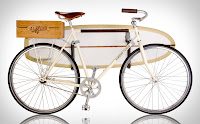
The surfing industry has - very slowly - been waking up to its environmental impact over the last few years. Even though we 'are at one with the ocean', our sport is actually pretty destructive, as we largely use oil based products and have / want to travel to surf. Foam blanks and glassing also uses nasty chemicals called volatile organic compounds which have also been linked with cancer. The production of cotton for clothing is also pretty damaging to the environment.
So what can a surfer do if s/he wants to reduce their environmental impact? Here are some ideas:
1. Don't buy if you don't need to. I'm not advocating stealing or surfing butt naked - just really evaluating if you need new stuff. Try to look after it and mend it.
2. Buy second hand. Buying second hand boards is an especially good way of extending the life of stuff.
3. Buy goods made in a more environmentally friendly way. This can be a bit difficult as not many surf companies use internationally recognised standards, but usually buying stuff made from recycled materials (usually 'upcycled' from something less valuable e.g. a fleece made from recycled bottles), a natural material rather than oil (e.g. cork deck pad rather than plastic), organically grown materials is better. Companies that specialise in this kind of thing are Patagonia, Finisterre, SAS and Wave Tribe for wetsuits, clothing and accessories and Otter and Grain or Unsung Hero for wooden surfboards or biofoam alternatives. Even the big brands are now doing more eco-friendly stuff - search an online site like Surfdome using the term 'recycled' and you'll be stunned with what's out there. It can be a bit (or -for some of these, a lot) more expensive but use online sales and look after it.
4. Travel less and / or share vehicles. Try to use cars and ferries rather than flying. When you get there, stay somewhere that leaves a light footprint.
Tony Butt has set this out far more eloquently in his SAS guide to sustainable surfing, but I hope this provides a few easy tips to help you.
No comments:
Post a Comment
Agree? Disagree? Let others know.